By staff reporter LU RUCAI
By staff reporter LU RUCAI
IF possible, I want to work till the end of my life,” 64-year-old forest ranger Yu Jianhua said. Yu’s work at the Baima Snow Mountain National Nature Reserve of Diqing Tibetan Autonomous Prefecture in Yunnan Province for the past 20 years has been to protect the Yunnan snub-nosed monkey.
Although the coniferous forests of Yunnan and Tibet are this ape’s habitat, its name reveals links with France. In 1871, Frenchman Pere Armand David reported sightings of this unnamed animal. Almost 20 years later, his compatriots R. P. Soulie and Monseigneur Biet commissioned local hunters in Deqen County to capture seven Yunnan snub-nosed monkeys of different ages and both genders, and sent them to a museum in Paris. After a thorough examination, French zoologist Alphonse Milne-Edwards gave these specimens a scientific description and nominated the species Rhinopithecus bieti in tribute to one of its first captors.
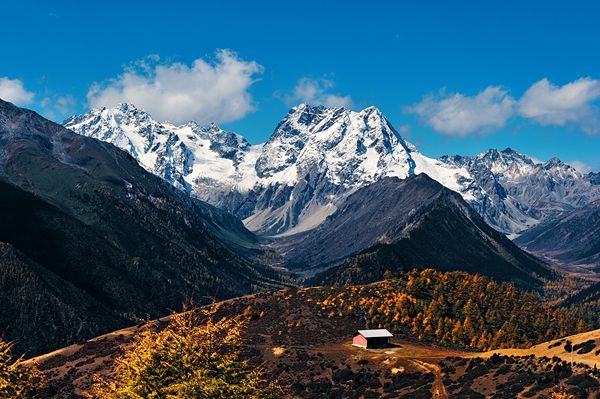
The landscape of the Baima Snow Mountain National Nature Reserve in Diqing Tibetan Autonomous Prefecture. CFP
Yu’s ignorance about the origins of his beloved monkey’s scientific name does not impair his desire to protect it. Yu’s home is in Xiangguqing Village within the Shangri-La National Park. Its inhabitants are mainly people of the Lisu ethnic group. There are a dozen households in the community where Yu lives, and almost every one houses a ranger.
Led by Yu, these specialist rangers have expanded to more than 20. The number of Yunnan snub-nosed monkeys has also increased to more than 500 from the 380 of 20 or more years ago.
From Hunter to Ranger
The habitat of the Yunnan snub-nosed monkey is at a relatively high elevation. In China, they command national protection, and to Yu, they are like family members. According to Yu’s observations, the Yunnan snub-nosed monkey also treats its family – a polygamous patriarchal system – as a basic social unit. Around nine families of a total 50 monkeys live in the national park. The rangers have given them such names as “big body,” “red face,” and “broken hand,” according to their physical features.
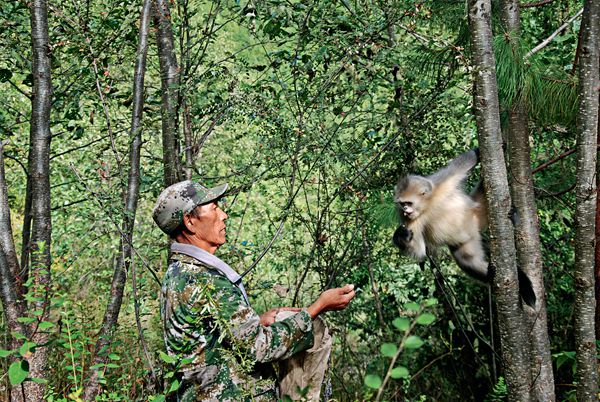
Yu Jianhua’s work over the past 20 years has been to protect the Yunnan snub-nosed monkey. Dixuan
Every morning at around five o’clock, Yu, dressed in camouflage suit and rubber boots, sets out for the mountain taking with him the monkeys’ favorite foods. Despite carrying a dozen kilos or more, Yu maintains a swift pace. “At times when I’ve had lots of walking to do I’ve worn out a pair of shoes in just one week,” Yu said. In the old days of frugal living, his wife complained a lot about that.
It’s hard to imagine that this ranger, so dedicated to protecting the Yunnan snub-nosed monkey, was once a well-known hunter in the village, and lived by both farming and hunting. “But we never hunted monkeys. They are our ancestors,” Yu said. When he heard around 20 years ago that the government was going to protect the snub-nosed monkey, he immediately registered as a ranger. Earning a daily six-yuan subsidy and supplied with a pair of worn-out shoes, Yu had no complaints about his work. But he had to give up smoking because, “I couldn’t afford it any more.” Gradually an emotional bond formed between him and the monkeys. His monthly 180-yuan subsidy remained unchanged for 12 years.
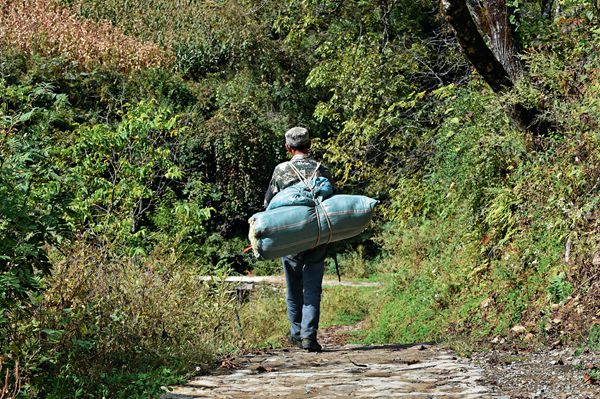
Yu Jianhua sets out on foot loaded with monkey feed.
This meager income did not deter local people, spurred by their affection for the monkey, from joining Yu’s team of rangers. Its members peaked at around 20. Even after the subsidy rose to RMB 1,200, young people seldom worked as rangers for long. Compared with what they could earn in big cities, it was peanuts. This made it difficult to find new blood for the ranger team.
Ensure a Safe Environment
Yu believes that the increased subsidy is attributable to commercialized operations. Since the Yunnan Snub-nosed Monkey National Park in Shangri-La invited a company to run its tourism business, more visitors have come here.
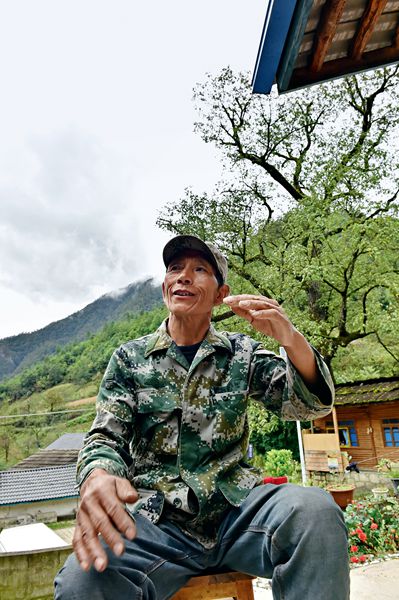
Yu is dedicated to ensuring the stability and growth of the ape colony.
The 50-plus monkeys that Yu and his team feed every day are what tourists see in the park, although 400 or more live outside the park, Yu said. But he can only leave the park twice or thrice a month to check whether they are safe.
Yu’s team knows the 50 or so monkeys in the park well, as they have to follow their tracks to feed them and ensure their safety. They generally go home when the ape colony falls asleep. Yu often finds himself in a quandary, however. “The growing influx of tourists must alarm the monkeys, and tourists would be disappointed if they had no access to the apes. But of the two, I’m more concerned about monkeys’ wellbeing.” Yu hence does his best to ensure the stability and growth of the ape colony.
Yu also acknowledges the obvious benefits that the tourism company has brought. As the formerly secluded village greets more and more visitors from the outside world, villagers can now sell them their home-grown produce, like chestnuts, walnuts, and pawpaw. This earns an income that would otherwise be out of reach.
The ape colony and the rangers have become used to each other. For Yu, although his work is hard and laborious, he feels uncomfortable and worried if he doesn’t see the monkeys for a few days. At busy farming seasons, rangers feed the monkeys in shifts, and are on duty even at Spring Festival. And it seems the monkeys appreciate local people’s kindness to them. “They have never once eaten farmers’ crops,” Yu said proudly.
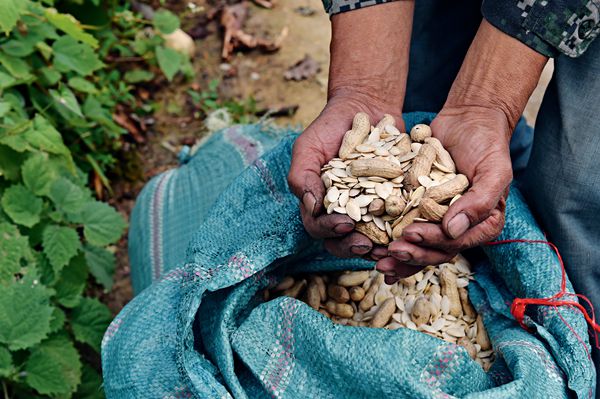
The Yunnan snub-nosed monkeys’ favorite food.
Yu is heartened by the growing animal protection awareness among local people, and the fewer instances of poaching. Showing a trap that he found in the forest, Yu said that he used to dismantle seven to eight daily, but now only spots 40 to 50 throughout the entire year.
Family Ties
Yu’s son’s joining the team gave him another pleasant surprise. Now 28, Yu Zhonghua previously showed no interest in being a ranger. But after years of living in Lijiang City as a migrant worker, Yu Zhonghua returned and became a ranger, but in a different team from his father. Tall and muscular, Yu Zhonghua leads a 16-member team of rangers.
Yu Zhonghua admitted that he’d had other ambitions other than working as ranger, but that as he gets older, he understands his father’s choice. After graduating from middle school Yu Zhonghua, like many other young people in his village, chose to migrate to Lijiang, a tourist city in Yunnan, and find work. He had jobs in many fields, and generally earned an average monthly income of RMB 2,000-3,000. Then one day it suddenly struck him just how rare the snub-nosed monkey in his hometown is, and the importance of protecting it.
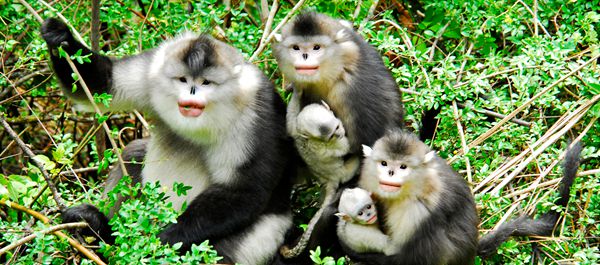
Yunnan snub-nosed monkeys.
Dixuan Uncredited photos by Yu Xiangjun
“In 2015, we installed infrared cameras in the wilderness, and captured images of legendary rare animals like the black bear, lesser panda, rhesus monkey, and white belly pheasant.” Yu Zhonghua always lights up at the mention of these unexpected bonuses. At the end of this busy season, Yu and his colleagues will collect the cameras they put in place in 2016. He is very much looking forward to seeing the pictures.
Changes in the village also give Yu Zhonghua hope. “Thanks to our country’s targeted poverty alleviation efforts, formerly poor rural households are now all equipped with wood-saving stoves and solar water heaters. Local people living in the nature reserve now also largely refrain from cutting firewood, and instead walk a longer distance to collect dry kindling,” Yu said. In the past villagers balked at burning rotten wood in their self-made stoves because of the difficulty in lighting it and the thick smoke it gave off. Since the government resolved the stove problem, villagers have willingly cooperated with its call for ecological protection.
Yu Zhonghua works six km from his home, and travels there by motorcycle. Apart from his work outside, he also goes to the office to complete investigation reports. “It perplexes me that my father has stuck to this work for 20 years. When ranging the forest, I find it hard to keep up with him,” Yu Zhonghua said. He has also witnessed other evident progress thanks to his father’s efforts. “In the past it usually took people a week to find a monkey, but now you have to fend off the colonies that surround you.”
In 2011, Yu Jianhua was named at a provincial environmental protection award event as one of 10 outstanding figures in this respect. It is one of the few awards Yu has garnered over the past 20 years. Holding the trophy, he said it serves as recognition of his work, but that one such token is enough.